Dentures – a new set of dentures
Dentures - a new set of dentures
A new eye-catcher
You have new dentures. That is a big change, because your new dentures play an important role in chewing and speaking. In addition, your artificial teeth are very important for your appearance. After all, your teeth are your first eye-catcher.
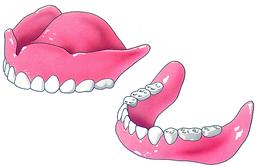
Get used to your new dentures
Your new dentures probably won't fit right away. It is new and above all different. And you definitely have to get used to that. You will encounter some difficulties, especially in the beginning. Your dentist or dental technician* will guide you well during the difficult initial period, so that you can get used to your new teeth as quickly as possible. Go back to your practitioner for follow-up and periodic check-ups.
* We are simply talking about the practitioner here.
NB. This can be a dentist or a prosthodontist. A dental technician is originally a dental technician who specializes in treating patients with dentures.
Appearance
Especially when you look in the mirror, you will have to get used to it. Your upper lip can be a little 'fuller' and your face a little less sunken. You and people around you will have to get used to your new appearance.
Food
Eating with your new dentures is a bit uncomfortable. You will have to be careful, especially in the beginning. You yourself experience the best of what is possible and what is not. For the first few days, take soft foods, such as mashed potatoes, minced meat and soft fruit. Try a piece of fish and a potato a few days later. Later on you can eat food such as meat or an apple. It is better not to bite off pieces with dentures. Cut your food into pieces and chew slowly and evenly. Take a piece of food in the mouth on both sides. Take more time than you are used to.
To talk
With your new dentures you talk a bit awkwardly at first. For example, you lisp. Or certain sounds sound different than you were used to. It's like talking with your mouth full. This is normal. Your mouth still has to get used to your new dentures. Usually it gets a lot better after a few days. Practice extra with those words or letters that don't quite sound to your liking yet. For example, read the newspaper aloud.

Pain from new dentures
Wearing your new dentures can be painful at first. It fits tightly against your jaws. Maybe a little too tight in some places. This can cause sensitive pressure points. Your practitioner can usually take away this pain by making a small correction to your dentures. Never file or sand your dentures yourself!
For a good result it is important that you keep your dentures in your mouth. Try to talk and eat directly with it. The practitioner will check your dentures a few days after they have been placed. Have you decided to remove your dentures because of the pain or unfamiliarity? Then do it again at least half a day before you go to the practitioner! Otherwise, he will not be able to recognize the painful spots. Don't be tempted to put your old dentures back in. That only makes getting used to the new one more difficult. With your new dentures it is often a matter of perseverance!
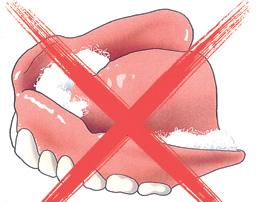
Cleaning your dentures
Your dentures are still new and beautiful. Of course you want to keep it that way. That is why, just like with your own teeth, you must take care of your dentures. If you do not clean it regularly, food residue and plaque will remain. Both on your dentures and underneath. If you don't remove it, your gums can eventually become inflamed. Therefore, clean your dentures carefully after every meal. Use a special denture brush and soap and water to properly remove food residues and dental plaque. Do not use toothpaste. It can rub too much. Clean dentures always feel smooth. Do not let the dentures slip out of your hands during cleaning. It will break. To be on the safe side, first fill the sink with water or place a towel in it and clean your dentures above it.
You do not clean your dentures with a denture cleaner; you do this, as mentioned earlier, with a denture brush and soap and water. You can, however, consider placing your dentures overnight in a weakly-acting denture cleaner (for example from ®Ecosym) a few times a week. This prevents discoloration caused by tea or red wine, for example, and the formation of tartar on your dentures. Then brush your dentures well and rinse them with water. Never put your dentures in hot water and do not use aggressive denture cleaners, especially bleach or abrasives.
Also clean your mouth
Clean not only your dentures, but also the mucous membrane on which your dentures rest: your jaws, palate and the transition from the jaw to the cheeks. Otherwise annoying inflammations can occur. And now also applies: prevention is better than cure. Massage the mucous membrane at least once a day with a soft toothbrush, paying extra attention to your palate. Use a regular toothpaste to clean your mouth.
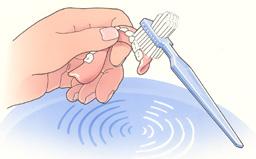
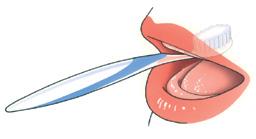
Remove your dentures at night
When you go to sleep, your jaws also need to rest. Therefore, remove your dentures when you go to bed and clean your dentures. This prevents inflammation of the mucous membrane on the jaws. Do you find it annoying to sleep with an empty mouth? Then only remove your lower teeth. Do you still want to wear your entire denture day and night? Then clean the prosthesis extra thoroughly every day.
Do you not have the dentures in your mouth? Then clean it well and store dry in a sealed container or wet in a glass of water. Change the water every day! Optionally, you can add a weak cleaning agent. Always rinse the dentures well with water before putting them back in your mouth.
Once a denture, forever ready?
Over time you will get used to your new artificial teeth. So good, in fact, that it seems like they've been around forever. But it won't stay that way. Your mouth changes because your jaws shrink. Your dentures will remain the same size. This creates space between your dentures and your
jaw, which will eventually loosen your dentures. If your dentures no longer fit properly, it may put more pressure on some places on your jaw than others.
That can cause pain. Do not sand or file your dentures yourself, but go to your practitioner! In such a case, your practitioner will adjust your dentures. He can put a new layer or 'lining' in your dentures, making it more secure.
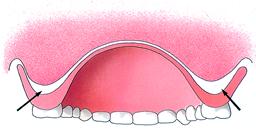
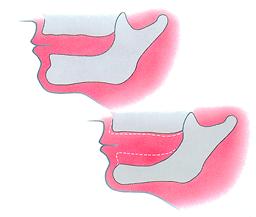
Monitoring by your practitioner is important
To prevent pain and to be able to detect loosening of your dentures in good time, it is advisable to visit the practitioner for a check-up at least once every two years. Go even if you have no complaints. The shrinking of your jaws goes very unnoticed. So you will not notice it at first. Your practitioner can make your dentures fit properly again. Or he can advise you to get a new one in time, because dentures can also wear out. The practitioner also checks whether your mouth is still healthy. Especially people with ill-fitting dentures or people who have been wearing their dentures for years can get annoying mouth defects.
Adhesive pastes, adhesive powders and other aids
There are all kinds of adhesive pastes, adhesive powders and 'liners' on the market to give dentures more hold. These resources are actually all emergency solutions. The cause of the problem is not really removed. Never put cotton wool under your dentures. Your jaws will only shrink faster. Are your dentures coming loose? Then go to your practitioner. He usually immediately sees what is going on and can give you the best advice.